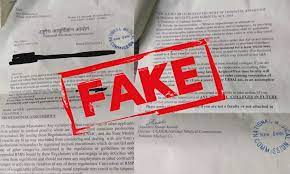A recent alert from the National Medical Commission (NMC) alerted medical institutions to a fictitious letter circulating on social media that purported to expel “ghost” faculties—that is, part-time faculty members. The governing body’s Undergraduate Medical Education Board (UMEB) has stressed that a forged letter allegedly signed by director UGMEB Sharan Kumar and dated February 3, 2023, is being circulated widely on social media.
The fictitious letter, which has raised serious questions and created a great deal of uncertainty among interested parties, claims that ghost faculty members are helping universities fabricate fingerprints for the Aadhaar-enabled biometric attendance system, thereby linking them to illegal activity. It instills a sense of urgency and terror in the recipients by threatening further action against the people mentioned in the letter.
The NMC has cautioned all stakeholders, including medical colleges, in response to this misleading communication, advising them not to fall for such dishonest strategies. Reiterating that official communications are only available on the NMC’s official website, nmc.org.in, the commission urged interested parties to confirm the legitimacy of any notices, circulars, or letters by going directly to the official source.
The caution issued by the NMC serves as a reminder of the increasing threats that false information and fraudulent activity face in the digital era, particularly in delicate industries like healthcare education. It emphasizes how crucial it is to be watchful, to double-check, and to communicate responsibly in order to preserve integrity and confidence in the medical education system.
The alert also illustrates how the NMC is being proactive in addressing new dangers and making sure that its communications are credible and transparent. The NMC wants to protect the good name and integrity of medical education providers and professionals. To that end, it has clarified that the purported letter does not exist and advised relevant parties on verification procedures.
The NMC’s alert is a welcome reminder that, particularly in vital fields like healthcare education, one must use caution and critical thinking when confronted with false information. Stakeholders may reduce the impact of fake news and promote integrity and confidence in medical education and governance by encouraging transparency, verification, and appropriate communication practices.








